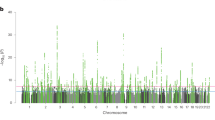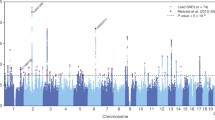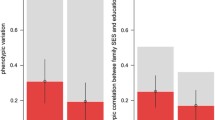Abstract
Genome-wide association studies for educational attainment have been limited to Europeans, but genetic factors might be largely related to cultural environments and thus dependent on populations. We aimed to identify genetic associations with educational attainment in Koreans. We analyzed genome-wide associations with the schooling years of 8770 individuals who participated in the Korea Association Resource cohort employing a mixed model. The analysis revealed two nucleotide variants (rs6467024 and rs16951883) using a genome-wide significance threshold (P < 5 × 10–8), and six variants (rs9844107, rs11114203, rs12273277, rs16869287, rs1526390, and rs6856418) using a suggestive threshold (5 × 10–8 < P < 1 × 10–6). They are located in proximity to the genes that encode GRIN2A, SLIT2, AGTR1, PAWR, and TBC1D1, which are involved in cognitive functions and/or psychiatric diseases. We found two novel genetic associations with educational attainment, which largely corresponded to associations with cognitive functions and psychiatric diseases.


Similar content being viewed by others
REFERENCES
Von Stumm, S., Macintyre, S., Batty, D.G., et al., Intelligence, social class of origin, childhood behavior disturbance and education as predictors of status attainment in midlife in men: the Aberdeen Children of the 1950s study, Intelligence, 2010, vol. 38, pp. 202—211.
Miller, P., Mulvey, C. and Martin, N., Genetic and environmental contributions to educational attainment in Australia, Econ. Educ. Rev., 2001, vol. 20, pp. 211—224.
Lehto, K., Akkermann, K., Parik, J., et al., Effect of COMT Val158Met polymorphism on personality traits and educational attainment in a longitudinal population representative study, Eur. Psychiat., 2013, vol. 28, pp. 492—498.
Ham, B.J., Lee, Y.M., Kim, M.K., et al., Personality, dopamine receptor D4 exon III polymorphisms, and academic achievement in medical students, Neuropsychobiology, 2006, vol. 53, pp. 203—209.
Davies, G., Marioni, R.E., Liewald, D.C., et al., Genome-wide association study of cognitive functions and educational attainment in UK Biobank (N=112 151), Mol. Psychiatry, 2016, vol. 21, pp. 758—767.
Beauchamp, J., Cesarini D., Van der Loos, M.J., et al., A genome-wide association study of educational attainment, 2010. https://doi.org/10.2139/ssrn.16550232010.
Martin, N.W., Medland, S.E., Verweij, K.J., et al., Educational attainment: a genome wide association study in 9538 Australians, PLoS One, 2011, vol. 6. e20128
Rietveld, C.A., Medland, S.E., Derringer, J., et al., GWAS of 126 559 individuals identifies genetic variants associated with educational attainment, Science, 2013, vol. 340, pp. 1467—1471.
Okbay, A., Beauchamp, J.P., Fontana, M.A., et al., Genome-wide association study identifies 74 loci associated with educational attainment, Nature, 2016, vol. 533, pp. 539—542.
Cho, Y.S., Go, M.J., Kim, Y.J., et al., A large-scale genome-wide association study of Asian populations uncovers genetic factors influencing eight quantitative traits, Nat. Genet., 2009, vol. 41, pp. 527—534.
Yang, J., Lee, S.H., Goddard, M.E., and Visscher, P.M., GCTA: a tool for genome-wide complex trait analysis, Am. J. Hum. Genet., 2011, vol. 88, pp. 76—82.
Euesden, J., Lewis, C.M., and O’Reilly, P.F., PRSice: polygenic risk score software, Bioinformatics, 2015, vol. 31, pp. 1466—1468.
Collingridge, G.L., Volianskis, A., Bannister, N., et al., The NMDA receptor as a target for cognitive enhancement, Neuropharmacology, 2013, vol. 64, pp. 13—26.
GTEx Consortium, The Genotype-Tissue Expression (GTEx) pilot analysis: multitissue gene regulation in humans, Science, 2015, vol. 348, pp. 648—660.
Glantz, L.A., Gilmore, J.H., Overstreet, D.H., et al., Pro-apoptotic Par-4 and dopamine D2 receptor in temporal cortex in schizophrenia, bipolar disorder and major depression, Schizophr. Res., 2010, vol. 118, pp. 292—299.
Anney, R.J., Lasky-Su, J., O'Dúshláine, C., et al., Conduct disorder and ADHD: evaluation of conduct problems as a categorical and quantitative trait in the international multicentre ADHD genetics study, Am. J. Med. Genet., Part B, 2008, vol. 147, pp. 1369—1378.
Wang, L.H., Chen, J.Y., Liou, Y.J., et al., Association of missense variants of the PRKC, apoptosis, WT1, regulator (PAWR) gene with schizophrenia, Prog. Neuropsychopharmacol. Biol. Psychiatry, 2008, vol. 32, pp. 870—875.
Takami, S., Imai, Y., Katsuya, T., et al., Gene polymorphism of the renin—angiotensin system associates with risk for lacunar infarction: the Ohasama study, Am. J. Hypertens., 2000, vol. 13, pp. 121—127.
Zannas, A.S., McQuoid, D.R., Payne, M.E., et al., Association of gene variants of the renin—angiotensin system with accelerated hippocampal volume loss and cognitive decline in old age, Am. J. Psychiatry, 2014, vol. 171, pp. 1214—1221.
Ge, J., and Barnes, N.M., Alterations in angiotensin AT 1 and AT 2 receptor subtype levels in brain regions from patients with neurodegenerative disorders, Eur. J. Pharmacol., 1996, vol. 297, pp. 299—306.
Rietveld, C.A., Esko, T., Davies, G., et al., Common genetic variants associated with cognitive performance identified using the proxy-phenotype method, Proc. Natl. Acad. Sci. U.S.A., 2014, vol. 111, pp. 13790—13794.
Hill, W.D., Davies, G., Liewald, D.C., et al., Age-dependent pleiotropy between general cognitive function and major psychiatric disorders, Biol. Psychiatry, 2015, vol. 80, pp. 266—273.
Poelmans, G., Pauls, D.L., Buitelaar, J.K. and Franke, B., Integrated genome-wide association study findings: identification of a neurodevelopmental network for attention deficit hyperactivity disorder, Am. J. Psychiatry, 2011, vol. 168, pp. 365—377.
Li, J.C., Han, L., Wen, Y.X., et al., Increased permeability of the blood—brain barrier and Alzheimer’s disease-like alterations in slit-2 transgenic mice, J. Alzheimer Dis., 2015, vol. 43, pp. 535—548.
Suarez, B.K., Duan, J., Sanders, A.R., et al., Genomewide linkage scan of 409 European-ancestry and African American families with schizophrenia: suggestive evidence of linkage at 8p23.3-p21.2 and 11p13.1-q14.1 in the combined sample, Am. J. Hum. Genet., 2006, vol. 78, pp. 315—333.
Zhao, W.Q. and Alkon, D.L., Role of insulin and insulin receptor in learning and memory, Mol. Cell Endocrinol., 2001, vol. 177, pp. 125—134.
Seshadri, S., DeStefano, A.L., Au, R., et al., Genetic correlates of brain aging on MRI and cognitive test measures: a genome-wide association and linkage analysis in the Framingham Study, BMC Med. Genet., 2007, vol. 8, p. 1.
Maher, A.C., Fu, M.H., Isfort, R.J., et al., Sex differences in global mRNA content of human skeletal muscle, PLoS One, 2009, vol. 4. e6335
Stone, S., Abkevich, V., Russell, D.L., et al., TBC1D1 is a candidate for a severe obesity gene and evidence for a gene/gene interaction in obesity predisposition, Hum. Mol. Genet., 2006, vol. 15, pp. 2709—2720.
Claxton, A., Baker, L.D., Wilkinson, C.W., et al., Sex and ApoE genotype differences in treatment response to two doses of intranasal insulin in adults with mild cognitive impairment or Alzheimer’s disease, J. Alzheimer Dis., 2013, vol. 35, pp. 789—797.
Must, A., Kõks, S., Vasar, E., et al., Common variations in 4p locus are related to male completed suicide, Neuromol. Med., 2009, vol. 11, pp. 13—19.
ACKNOWLEDGMENTS
This work was supported by the National Research Foundation of Korea (NRF) grant funded by the Korea government (MSIT) (no. NRF-2018R1A2B6004867).
Author information
Authors and Affiliations
Corresponding author
Ethics declarations
COMPLIANCE WITH ETHICAL STANDARDS
Ethical approval was obtained from the Institutional Review Board of the Korea National Institute of Health, and all participants provided written informed consent after the aims and nature of the study were disclosed.
COMPETING INTERESTS
The authors declare that they have no conflict of interest.
Rights and permissions
About this article
Cite this article
Ryu, J., Lee, C. Genome-Wide Association Study Reveals Two Nucleotide Variants Associated with Educational Attainment in Koreans. Russ J Genet 55, 1130–1136 (2019). https://doi.org/10.1134/S1022795419090138
Received:
Revised:
Accepted:
Published:
Issue Date:
DOI: https://doi.org/10.1134/S1022795419090138




